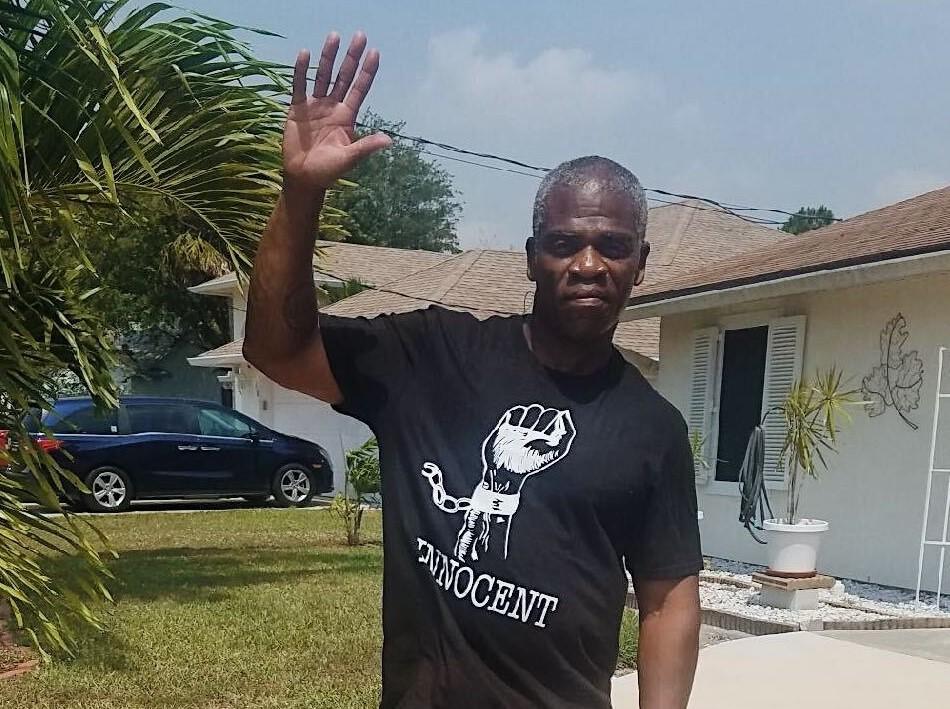
Caption
Leonard Cure, who in 2020 was exonerated of an armed robbery conviction in Florida, was killed in a combative traffic stop in Georgia in October 2023.
Credit: Innocence Project of Florida
LISTEN: The attorney representing the family of wrongfully convicted exoneree Leonard Cure is condemning a sheriff's deputy for how he handled a traffic stop that turned deadly. GPB's Benjamin Payne reports.

Leonard Cure, who in 2020 was exonerated of an armed robbery conviction in Florida, was killed in a combative traffic stop in Georgia in October 2023.
Prominent civil rights attorney Ben Crump is condemning a Camden County sheriff's deputy after the release of police video showing a traffic stop Monday that resulted in the killing of 53-year-old Leonard Cure.
“It is just a tragic situation that there wasn't an attempt to deescalate the matter from the beginning by the law enforcement officer,” said Crump, who has been retained by Cure's family. “There are things in the video that are very troubling from both perspectives.”
The footage — which includes one body camera video and two dash camera videos — shows Staff Sgt. Buck Aldridge, who is white, yelling at Cure, who is Black, immediately after Aldridge exits his patrol vehicle. Cure was sitting in his truck, which Aldridge said had been going 100 miles per hour on northbound Interstate 95 between Kingsland and Woodbine.
After initially not complying with Aldridge's command to exit the truck and put his hands on the back of the truck, Cure complied. Aldridge then told him that he was under arrest and ordered that he put his hands behind his back and that he would be stun-gunned if he did not comply.
“Those words — that you're going to be arrested and go to jail — after being wrongfully convicted for all those years, we believe triggered him,” Crump said of Cure, who had been wrongfully sentenced to more than 16 years in Florida prison for armed robbery, before being exonerated in 2020.
Cure did not comply with Aldridge's command to put his hands behind his back; instead, he raised his left arm to the sky, at which point Aldridge stun-gunned Cure.
Cure endured the weapon's shock for about five seconds before flailing his arms at Aldridge. The two fought for about 25 seconds along the shoulder of the interstate, with Aldridge striking Cure with a baton and Cure covering Aldridge's face with his hand.
Aldridge then fired his handgun at Cure, at which point Cure dropped to the ground. It is unclear from the videos whether Aldridge fired his gun again.
Paramedics tried to resuscitate Cure at the scene. He was later pronounced dead.
“I've seen up-close confrontations between citizens and law enforcement that didn't result in a person being killed,” said Cure's brother Wallace Cure.
“[Aldridge] got out yelling at him,” Cure's brother Michael Cure said. “Yelling commands and screaming at him. And my brother was compliant. He was quite compliant. And there was no attempt to deescalate — none whatsoever. When he tased him, that exacerbated the situation and my brother did turn and get a bit physical.”
Michael Cure said that he believed “there were possibly some issues going on — some mental issues — with my brother,” including post-traumatic stress disorder from his wrongful incarceration. “The officer triggered him — undoubtedly triggered him. It was excitement met with excitement.”
Michael Cure added that Aldridge “should have known that there may have been some issues” with his brother.
“When you see escalation met with escalation from both individuals, that never leads to anything good,” Crump said.
The Georgia Bureau of Investigation, which is handling the case, said that it would turn over its findings from the investigation to Brunswick Judicial Circuit District Attorney Keith Higgins.
As reported by the Atlanta Journal-Constitution, Aldridge previously served for five years as a Kingsland Police Department officer, until he was fired in 2017 for violating policies on the use of necessary and appropriate force, as well as on/off-duty conduct. Aldridge was hired by the Camden County Sheriff's Office less than one year later.
Cure was exonerated from his armed robbery conviction with the help of the Innocence Project of Florida, a legal organization that works to free wrongly convicted individuals.
“From talking to many clients,” said the group's executive director, Seth Miller, “their biggest fear is that on the other side of that door or at a traffic stop, they're going to be sent right back to where they were, where they worked so hard to get out of, for something they didn't do.”